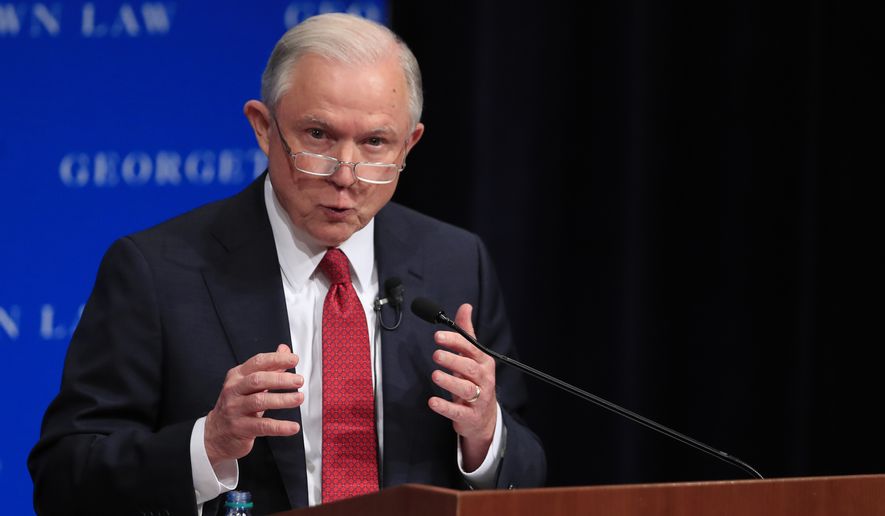The Trump administration thrust itself into the midst of the battle over free speech on college campuses Tuesday, siding with activists in a case challenging a Georgia school’s strict limits on where and how students can express themselves.
Attorney General Jeff Sessions warned that freedom of thought and speech are “under attack” on college campuses, and he called on university officials to “boldly and unequivocally” defend free expression rather than stifle it.
“The American university was once the center of academic freedom — a place of robust debate, a forum for the competition of ideas,” Mr. Sessions said as he spoke to students at Georgetown Law School in Washington. “But it is transforming into an echo chamber of political correctness and homogenous thought, a shelter for fragile egos.”
While the attorney general said the problems concern all sides of the political spectrum, the case in which the Justice Department sought to intervene involved a Christian student who challenged Georgia Gwinnett College’s “free speech zone” policy.
Chike Uzuegbunam said the school violated his First Amendment rights when officials told him he could not distribute flyers about his Christian faith unless he did so in one of the school’s two “free speech expression areas,” and even then he would be required to get advance approval.
The Justice Department filed a statement of interest in the case, which allows government attorneys to weigh in on legal matters presented without being party to the lawsuit.
The department said the college’s speech policies “were not content-neutral, established an impermissible heckler’s veto, and were not narrowly tailored to achieve a compelling government interest.”
Dozens of students and law school faculty protested Mr. Sessions’ speech by kneeling on steps outside the building. The demonstration harked to pro football players who knelt during the national anthem before games this year.
A handful of protesters who attended Mr. Sessions’ speech stood briefly with tape over their mouths after he finished.
The Justice Department moved in the Georgia case as universities across the country are struggling to find a balance between free speech and, in cases of state universities, the First Amendment and protecting students who say they are offended or feel threatened by the views of others on campus.
Over the weekend, the University of California, Berkeley, spent $800,000 to provide security for an appearance by conservative speaker Milo Yiannopoulos, who spoke for just 15 minutes before noisy protests cut him off.
As college administrators seek to walk that line, they often have settled on overly restricted policies, said Ken Paulson, president of the Newseum Institute’s First Amendment Center.
“You can set policies for how a speaker gets invited, establish broad guidelines on where speech is permissible, but you can’t do that in a way that targets one point of a view or another or limits free speech on campus,” Mr. Paulson said.
Mr. Sessions said the Georgia case is just the beginning and the Justice Department intends to file statements of interest in other college free speech cases.
“A national recommitment to free speech on campus and to ensuring First Amendment rights is long overdue,” Mr. Sessions said.
He took specific issue with college administrators who sought to prohibit speech in advance if there is even a threat that such speech will be met with protest — a concept known as the “heckler’s veto.”
“This permissive attitude toward the heckler’s veto has spawned a cottage industry of protesters who have quickly learned that school administrators will capitulate to their demands,” Mr. Sessions said. “Protesters are now routinely shutting down speeches and debates across the country in an effort to silence voices that insufficiently conform with their views.”
PEN America said it agreed with combating political correctness but added that Mr. Sessions’ review of policies against free speech seemed skewed toward incidents involving conservatives.
“As the Justice Department wades into issues of campus speech, we hope its defense of free expression on campus will encompass not only opposition to infringements on free speech, but also the imperative to ensure that U.S. university campuses are truly open to the speech of all students, regardless of political leanings, LGBT status and racial, ethnic, or religious background,” PEN America Executive Director Suzanne Nossel said in a statement.
But for other free speech advocates, the Justice Department’s action was a welcome move.
“The attorney general was on point in saying there’s blowback on conservative viewpoints on college campuses,” said Roy Gutterman, the director of Syracuse University’s Tully Center for Free Speech. “It’s how the politics of today are playing out on college campuses. But you can go back 50 or 60 years and substitute right-wing suppression for left-wing suppression.”
An estimated 1 in 10 U.S. colleges have free speech zone policies that limit freedom of expression on campus, according to the Foundation for Individual Rights in Education.
“It’s a significant problem, but 90 percent of schools don’t use free speech zones and the sky hasn’t fallen,” said Joe Cohn, the foundation’s legislative and policy director. “There is no reason for the schools that do.”
Travis Barham, legal counsel for Alliance Defending Freedom, which filed the Gwinnett College lawsuit on behalf of Mr. Uzuegbunam, said he is encouraged to see the Justice Department’s involvement in the case.
With the impending threat that other campuses’ speech policies might come under Justice Department scrutiny, universities may be compelled to come up with solutions sooner rather than later, Mr. Paulson said.
“The Justice Department participation will accelerate the universities taking a hard look at free speech zones,” he said. “It was one thing to be criticized by columnists and pundits, and another to have the Department of Justice knocking at their door.”
• Andrea Noble can be reached at anoble@washingtontimes.com.




Please read our comment policy before commenting.